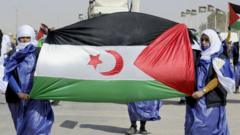In a historic change, the UK has publicly supported Morocco's plan for Western Sahara, signaling a strategic pivot in foreign policy influenced by business objectives tied to the 2030 World Cup.
UK Foreign Secretary David Lammy announced on a visit to Rabat that the UK now endorses Morocco's autonomy plan regarding Western Sahara, which will grant the region greater self-governance while keeping Moroccan sovereignty intact. This marks a significant shift from the UK’s previous neutral position on the long-standing territorial dispute, which has persisted for over five decades.
The announcement arrived as part of a broader framework to enhance UK-Morocco relations, particularly in the context of lucrative infrastructure projects related to the upcoming World Cup. Lammy underscored the importance of the deal, stating that it would allow British businesses to secure major contracts and strengthen economic ties during a high-profile global event.
Responding to Lammy’s endorsement, Moroccan Foreign Minister Nasser Bourita described it as a transformative moment in the two nations' 800-year history. He pointed out the new direction as a pathway towards resolving the enduring conflict over Western Sahara.
Despite this endorsement, Algeria—an ardent supporter of the Western Saharan independence movement—expressed regret, arguing that Morocco's autonomy proposal had not been put forth for meaningful negotiations with the Sahrawi people. Algeria's officials underscored that the recognition by the UK could be seen as one-sided, potentially exacerbating tensions in the region.
Western Sahara, a former Spanish colony rich in minerals, has been a contentious area ever since Moroccan forces took control in the mid-1970s, leading to conflict with the Polisario Front, which seeks independence for the Sahrawi people. Both sides have seen various ceasefires and intermittent negotiations with no successful resolution to the status of the territory, despite UN peacekeeping efforts since 1991.
As the world's eyes turn to the future of the region, this pivot in UK foreign policy on Western Sahara may signal a new chapter in international diplomacy influenced by economic and sporting interests.
UK Foreign Secretary David Lammy announced on a visit to Rabat that the UK now endorses Morocco's autonomy plan regarding Western Sahara, which will grant the region greater self-governance while keeping Moroccan sovereignty intact. This marks a significant shift from the UK’s previous neutral position on the long-standing territorial dispute, which has persisted for over five decades.
The announcement arrived as part of a broader framework to enhance UK-Morocco relations, particularly in the context of lucrative infrastructure projects related to the upcoming World Cup. Lammy underscored the importance of the deal, stating that it would allow British businesses to secure major contracts and strengthen economic ties during a high-profile global event.
Responding to Lammy’s endorsement, Moroccan Foreign Minister Nasser Bourita described it as a transformative moment in the two nations' 800-year history. He pointed out the new direction as a pathway towards resolving the enduring conflict over Western Sahara.
Despite this endorsement, Algeria—an ardent supporter of the Western Saharan independence movement—expressed regret, arguing that Morocco's autonomy proposal had not been put forth for meaningful negotiations with the Sahrawi people. Algeria's officials underscored that the recognition by the UK could be seen as one-sided, potentially exacerbating tensions in the region.
Western Sahara, a former Spanish colony rich in minerals, has been a contentious area ever since Moroccan forces took control in the mid-1970s, leading to conflict with the Polisario Front, which seeks independence for the Sahrawi people. Both sides have seen various ceasefires and intermittent negotiations with no successful resolution to the status of the territory, despite UN peacekeeping efforts since 1991.
As the world's eyes turn to the future of the region, this pivot in UK foreign policy on Western Sahara may signal a new chapter in international diplomacy influenced by economic and sporting interests.




















